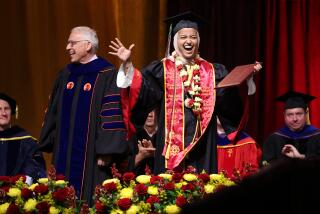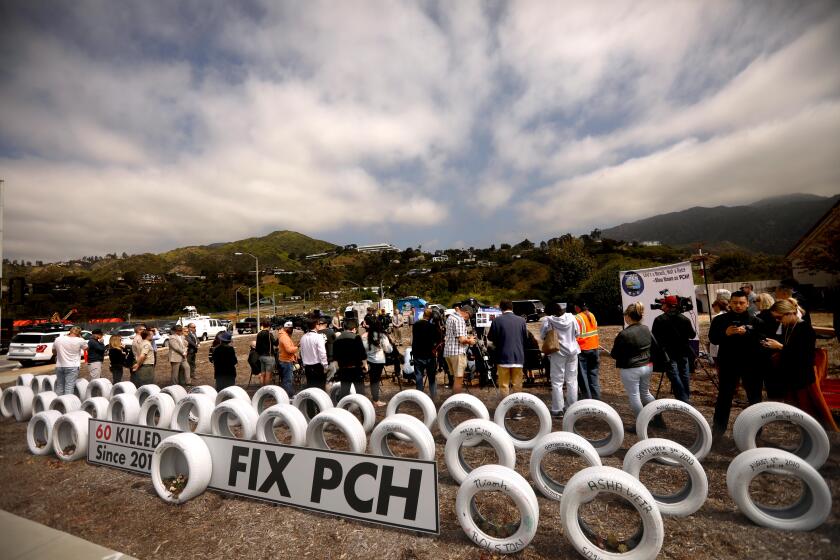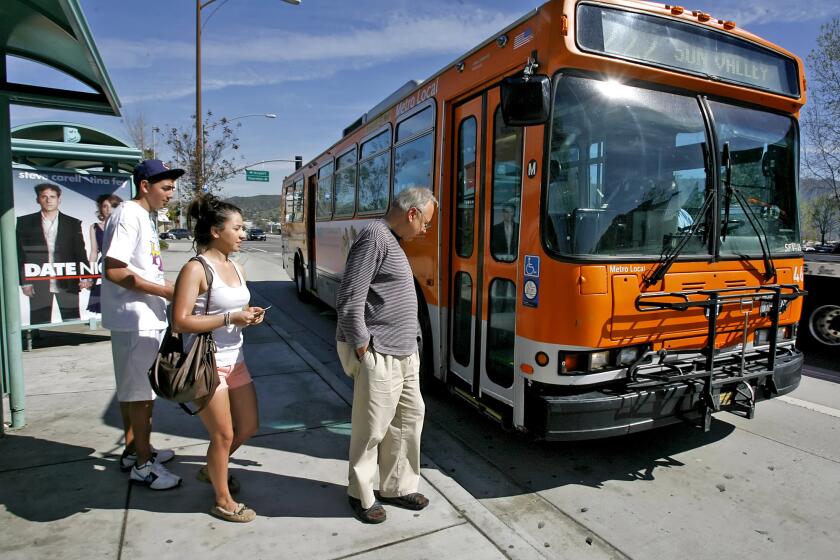Cash-Strapped RTD Hopes to Avoid Fare Increases, Service Cuts : Transit: Plan calls for borrowing money, deferring maintenance and trimming costs. Also, county panel must restore contribution it decided to reduce.
Juggling operating and construction accounts may let the Southern California Rapid Transit District cover a $55-million shortfall without raising fares or cutting service this year, but those options may be unavoidable next year, when the deficit could grow to $90 million.
RTD General Manager Alan Pegg presented that gloomy assessment in an internal report to the board of directors of the district last week.
Pegg, the district’s former treasurer-controller, said the current year’s budget balancing act will work only if the Los Angeles County Transportation Commission softens its resistance to several solutions, including deferring spending on new rail lines and reducing the RTD’s share of Metro Blue Line operating costs.
Pegg’s proposed solution to the budget crisis--borrowing money, deferring maintenance and cutting administrative costs--also assumes that the commission will reverse itself and not slash its subsidy of RTD’s operating budget by $30 million.
The commission said last month that it had to cut that amount from its annual grant to the RTD because it faces its own $133-million budget shortfall this year.
Pegg, however, said the LACTC promised the money and should “fulfill its obligation” to deliver it.
Earlier this year, the RTD predicted a $12-million shortfall because of fewer riders and greater use of discounted fares. The situation worsened in November when the district learned of the LACTC’s shortfall, which stems from lower sales tax revenues resulting from the recession.
Since then, $11.2 million in higher-than-expected operating costs have pushed the RTD’s shortfall to $55 million--a deficit that could grow by another $10.3 million if the district is denied state gas tax funds, an issue that state and county legal experts are debating.
County Transportation Commission Executive Director Neil Peterson has opposed deferring construction of new rail lines to make money available immediately for bus services. Savings can and should be found within the RTD’s $654.9-million operating budget, he said, without worsening local unemployment and increasing construction costs by postponing rail projects.
But Pegg said the LACTC should reconsider because the recession, while bad, may not be slashing retail sales as severely as commission consultants expected. He added that several projects in the commission’s “very ambitious” rail construction plan are running behind schedule--an unplanned spending deferral that should make more cash available now.
Pegg argued that making cuts to meet the full shortfall, 8.4% of the RTD budget, in the six months left in this fiscal year may force fare hikes or service cuts. That, he told his board of directors, “seriously jeopardizes” the LACTC’s own goal of improving public transit in the short term as a way “to promote the proliferation of rail lines.”
While the commission’s plan to continue building rail lines would keep people employed and increase sales tax receipts, Pegg said “reducing transportation in the region causes negative effects, since transit-dependent workers may not be able to get to work and therefore jobs are lost, worsening . . . the economic shrinkage.”
Within his own budget, Pegg suggested borrowing $11 million, instead of paying cash, to buy 202 new buses, freeing up that money for current operations. He also urged borrowing against or selling $9 million in equity the district has accumulated in its real property.
He noted, however, that such borrowing “will ultimately cause district operating subsidies to be reduced in the long term as interest must be paid upon debt incurred.”
Pegg also recommended saving $5 million by “reducing or eliminating bus cleanliness” and graffiti removal, deferring maintenance and inspections, continuing a strict hiring freeze and cutting travel, marketing and other administrative costs.
More to Read
Start your day right
Sign up for Essential California for news, features and recommendations from the L.A. Times and beyond in your inbox six days a week.
You may occasionally receive promotional content from the Los Angeles Times.






